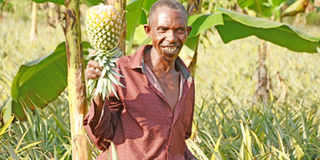Pineapples will liberate your pockets

A farmer pictured wearing a smile after harvesting his pineapple. Photo by George Katongole
What you need to know:
- Pineapples grow well at altitudes ranging from 100m to 1800m above sea level with rainfall ranges from 600 to about 1500mm annually. The crop does well in soils with high murram content as they allow for aeration than those with high clay content.
- The largest ones will have the most flesh. An aroma of sweetness is a tell-tale sign of a sweet fruit. Avoid the pineapples that appear to be old, have browned leaves, are bruised, have soft spots, are very green or overly dry.
Pineapples are the second most exported fruit in the world, after bananas, but with demand now growing sharply on the fashion for processing pineapples into wines, vinegars and baked goods, Uganda is ideally positioned to achieve export growth with the fruit.
According to a Global Market Review of Major Tropical Fruits report by the Food and Agriculture Organization (FAO), global exports of pineapple rose to around 3m tonnes in 2018, up 7.8 per cent from 2017.
Demand
The sharp growth was primarily driven by rising demand for the fruit in the US, where sales rose by 27.5 per cent, but was also supported by strong growth in other major markets, such as Israel and the Middle East.
Europe is also an important buyer of pineapples, accounting for nearly a third of the global market, and spanning East Africa’s major markets for pineapples in France, Germany, Italy, Belgium, Netherlands, Sweden and Denmark.
Figures
A key driver in the growth has been new product niches, such as pineapple wines and vinegar. In the US, for instance, 48 squeezed fresh pineapples make 25 bottles of wine that sell at Shs15,000 each.
While the costs go beyond the price of the pineapples themselves, based on the initial price of Shs1,000 per fresh pineapple (48 x 1000 = Shs48,000), the wine business adds many times that input cost in final value, with the 25 bottles selling for a total of Shs360,000.
Pineapples vs other fruits
Pineapples are also cheaper than most other tropical fruits, such as avocados and mangoes, further helping sales during a time of relative austerity in international markets.
According to Trigde, a US import Research Company, a kilogramme of pineapple costs Shs5,000 while that of mangoes costs Shs7,000.
Demand is also being boosted by the fruit’s rise as a cooking ingredient in pies and cakes. The global bakery market was estimated at $203.8bn in 2018 and is projected to expand at an average rate of 3.2 per cent a year from 2019 to 2025, according to Bakery Product Market Size, Share & Trends Analysis Report by Grand View Research Inc.
Finally, pineapple sales are rising as a result of the world population’s interest in healthy eating, which has seen an increase in the consumption of tropical fruits generally.
Eating pineapples gives the body healthy nutrition with energy and immunity vitamins being the two healthy highlights from the fruit. It also contains starch, potassium, Vitamin C, Protein, calcium and phosphorous.
Harvesting
Pineapples are picked when they are ripe and do not continue to ripen after they have been harvested, so if you want a tasty fruit it is important to know how and when to pick the fruit.
In deciding on what pineapple to pick, you should choose the one that is golden brown and is the freshest looking, it does not matter if the leaves fall off easily or not.
The largest ones will have the most flesh. An aroma of sweetness is a tell-tale sign of a sweet fruit. Avoid the pineapples that appear to be old, have browned leaves, are bruised, have soft spots, are very green or overly dry.
Storage
Pineapples are best kept in the refrigerator, but not necessary until cut. Cut fruits should be stored in an airtight container in the refrigerator for extended shelf life.
For a long term storage option, cut pineapple can be frozen if placed in freezer safe containers.
Some benefits of proper food storage include eating healthier, cutting food costs and helping the environment by avoiding waste.




